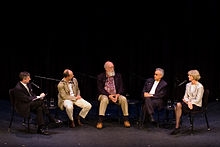Marc Hauser

Marc D. Hauser (25 October 1959) is an evolutionary biologist who teaches at the Psychology Department at Harvard University.
Biography
He received a BS from Bucknell University and a PhD from UCLA. Currently, Hauser is a Harvard College Professor, and Professor in the Departments of Psychology, Organismic & Evolutionary Biology, and Biological Anthropology. He is the co-director of the Mind, Brain, and Behavior Program at Harvard, Director of the Cognitive Evolution Lab, and adjunct Professor in the Graduate School of Education and the Program in Neurosciences.
Hauser's research sits at the interface between evolutionary biology and cognitive neuroscience and is aimed at understanding the processes and consequences of cognitive evolution. Observations and experiments focus on nonhuman animals and humans of different ages and mental competence, incorporating methodological procedures and theoretical insights from ethology, infant cognitive development, evolutionary theory, cognitive neuroscience and neurobiology. Current foci include: studies of language evolution, the nature of moral judgments, the development and evolution of mathematical representations, comparative studies of economic-like choice, the precursors to musical competence, and the nature of event perception.
One of his research projects is internet based 'The Moral Sense Test' in which the participant is presented with 10 hypothetical moral dilemmas and is asked to judge each one.
In August 2010 it was announced that Hauser decided to take a leave of absence from Harvard, after an internal investigation found evidence of scientific misconduct in a paper which was published in 2002 in the journal Cognition [1][2]. The New Scientist reports that, according to unnamed scientists in the field, Harvard decided to investigate his lab after students who had worked there made allegations of data falsification. [3] In the paper under question, Hauser and his collaborators concluded that cotton-top tamarin monkeys can learn simple rule-like patterns. In two further papers, some field notes or video recordings were lost. Following this discovery, Hauser and his co-author replicated the experiments reported in these two papers.[4][5] Gordon G. Gallup of SUNY Albany has raised concerns about a 1995 paper in which Hauser claimed to have found evidence that cotton-top tamarin monkeys can recognize themselves in a mirror.[6] He reviewed the videotapes and found that “there wasn’t even any suggestive evidence” for Hauser's published results.[6] In 2001, Hauser reported in the American Journal of Primatology that he could not replicate his earlier results.[7]
Harvard University is conducting an inquiry into the accusations surrounding Hauser's research.[4] In regards to two papers published in 2007, one in Science and the other in The Proceedings of the Royal Society, the Harvard inquiry panel found that data supporting the published results did not exist or were incomplete.[4] Following this discovery, Hauser and his co-author replicated the experiments reported in these two papers.[5]
Awards
Hauser is the recipient of a National Science Foundation Young Investigator Award, a science medal from the Collège de France, and a Guggenheim Fellowship. He has published approximately 200 articles in major research journals as well as six books. His work has frequently been covered by The New York Times, The Wall Street Journal, The Boston Globe, and The Washington Post, and he makes frequent appearances on various NPR shows, as well as television and international radio.
Bibliography
- Wild Minds: What Animals Really Think (illustrated by Ted Dewan) (Henry Holt, NY 2000)
- Moral Minds: How Nature Designed a Universal Sense of Right and Wrong (Harper Collins/Ecco, NY 2006).
- Evilicious: explaining our evolved taste for killing, torture, revenge, greed, mockery and masochism (in prep) (Viking/Penguin-USA; Random House UK.
References
- ^ Peter Aldhous (11 August 2010) Misconduct found in Harvard animal morality prof's lab New Scientist
- ^ Carolyn Y. Johnson (10 Aug 2010). Author on leave after Harvard inquiry Boston Globe.
- ^ "Misconduct found in Harvard animal morality prof's lab - life - 11 August 2010". New Scientist. 2010-08-04. doi:10.1098/rspb.2010.1441. Retrieved 2010-08-12.
- ^ a b c Nicholas Wade (12 August 2010) Inquiry on Harvard Lab Threatens Ripple Effect New York Times
- ^ a b http://rspb.royalsocietypublishing.org/content/early/2010/07/22/rspb.2010.1441.short
- ^ a b In Harvard Lab Inquiry, a Raid and 3-Year Wait, The New York Times, Aug 14, 2010
- ^ Hauser, Marc David; Miller, Cory Thomas; Liu, Katie; Gupta, Renu (2001). "Cotton-top tamarins (Saguinus oedipus) fail to show mirror-guided self-exploration". American Journal of Primatology. 53: 131. doi:10.1002/1098-2345(200103)53:3<131::AID-AJP4>3.0.CO;2-X.
